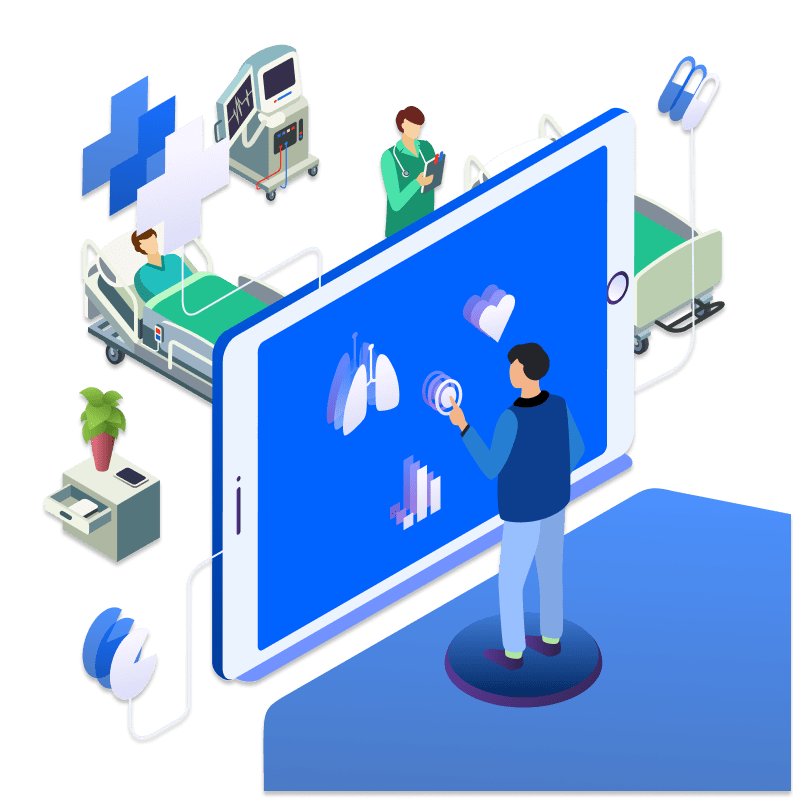Your Silent Driver of Healthcare Interactions.
We’ve helped healthcare organizations recover time, reduce costs, and accelerate processes, without disrupting what already works.
Our Healthcare Automation Services for You
We automate what slows you down securely, intelligently, and end to end.
Admin & Clinical Workflow Automation
Streamline intake, referrals, documentation, consent, and transfers with configurable no-code tools and RPA purpose-built for healthcare teams.
Claims & Billing RPA with AI Validation
Automate claims generation, submission, adjudication, and denial handling, augmented with AI-based validation and reconciliation logic.
Intelligent Document Capture & EHR Integration
Extract, classify, and route clinical documents and forms into EHRs and downstream systems using OCR and automation-ready pipelines.
Patient Engagement & Front-Desk Bots
Enable seamless appointment booking, intake, reminders, recalls, and satisfaction surveys across web, SMS, and email.
Agentic AI for Clinical Ops & RPM
Deploy autonomous AI agents for triage, remote monitoring, telehealth coordination, and diagnostics integrated with your care workflows.
Asset & Compliance Automation
Track medical equipment, automate inventory logs, and run HIPAA-compliant audit workflows using IoT and RPA orchestration.
Process Intelligence & Analytics
Uncover bottlenecks and optimize operations with continuous process mining, workflow metrics, and automation insights.
FHIR / EHR / Epic Integration Engineering
Build scalable integrations across EHRs and health data systems using FHIR APIs, HL7 messages, RPA/RDA, and custom logic layers.
How We Make Automation Work for You
Built with healthcare logic and deployed with technical depths.
Why It Matters:
Front-desk teams are overloaded with paper forms, manual data entry, and constant patient back-and-forth. These inefficiencies delay care, introduce data errors, and slow down clinical and billing workflows. Automation streamlines intake from the first click to the EHR, reducing wait times and freeing staff to focus on patients.
How We Do It:
We build structured digital intake flows that work across your website, patient portal, mobile, and kiosk. Each form is mapped to your EHR schema, so patient data including demographics, consent, symptoms, and insurance is auto validated and routed directly to the right fields. We support ID verification, symptom-based triage, and pre-visit documentation, reducing in-clinic wait times and eliminating rework. Every flow is tested against your EHR, registration systems, and analytics tools to ensure full downstream compatibility.
What’s Included:
- Digital forms and mobile-ready workflows
- Auto-validation and real-time routing
- EHR integration via FHIR and HL7
- Pre-visit triage, consent, and eligibility workflows
- Reusable form logic for scaling across departments
Why It Matters:
Claim delays, denials, and manual corrections create revenue leakage and operational friction. Staff often spend hours tracking claim status, correcting codes, or resubmitting rejected claims. Automation helps close the loop faster and more accurately, improving cash flow and reducing admin load.
How We Do It:
We build automation flows that extract claim-ready data from your EHR or billing system, validate it against payer rules, and format it into X12-ready messages for submission. Denied or pending claims trigger automated resolution workflows that retrieve missing information, generate corrected claims, or escalate exceptions to billing staff. Each process is tracked with audit logs and aligned with your revenue cycle timelines.
What’s Included:
- Automated claim creation and validation
- Payer-specific rules integration
- X12 837 and 835-ready formatting
- Denial handling and re-submission logic
- Claim status tracking and alerts
Why It Matters:
Clinical and administrative documents still arrive in fragmented formats—scans, faxes, PDFs, or emailed attachments. Manually sorting, labeling, and uploading them to the EHR slows staff down and risks data loss. Automation ensures timely, structured integration without bottlenecks.
How We Do It:
We implement document capture pipelines that extract, classify, and map incoming documents to the appropriate patient record, encounter type, or workflow in your system. Whether it's a referral, consent form, lab result, or insurance card, documents are parsed using intelligent rules and routed to the right team, system, or folder with minimal intervention.
What’s Included:
- OCR-based data extraction
- Document type recognition and tagging
- Secure EHR indexing and record association
- Support for fax, email, scan, and upload sources
- Configurable workflows for routing and escalation
Why It Matters:
Missed appointments, delayed follow-ups, and manual outreach campaigns drain staff time and reduce patient satisfaction. Consistent, personalized communication helps improve show rates, close care gaps, and keep patients connected to their care plans.
How We Do It:
We build multichannel engagement workflows that trigger messages based on patient actions, appointment status, or clinical milestones. From reminders and check-in links to recalls and satisfaction surveys, every message is automated, tracked, and personalized to each patient’s context. All communication logs are stored securely and can be integrated with your CRM or EHR.
What’s Included:
- Appointment reminders and rescheduling workflows
- Digital check-ins and pre-visit prompts
- Post-visit follow-ups and feedback collection
- Multi-channel delivery via SMS, email, and voice
- CRM or EHR-linked activity logging
Why It Matters:
Staffing shortages and growing caseloads make it harder to manage triage, post-discharge follow-ups, and routine patient monitoring. Agentic AI provides a scalable way to extend your clinical capacity without overloading teams.
How We Do It:
We deploy AI agents trained in specific clinical workflows such as symptom triage, chronic care follow-up, or behavioral health screening. These agents can initiate structured conversations with patients, collect relevant input, and escalate cases to care teams when needed. All interactions are logged and reviewed, ensuring transparency and auditability.
What’s Included:
- AI-driven patient follow-up agents
- Symptom triage and chronic care check-ins
- Secure integration with care coordination systems
- Custom rules for escalation and alerts
- Support for multilingual and adaptive messaging
Why It Matters:
Manually tracking medical assets and compliance tasks increases the risk of missed calibrations, expired certifications, and incomplete audit trails. Automation ensures equipment, inventory, and protocols stay aligned with regulatory standards and operational schedules.
How We Do It:
We implement asset monitoring workflows that integrate with IoT sensors, equipment logs, and facility systems to automate inventory tracking, maintenance reminders, and usage logs. Compliance tasks like HIPAA audits, environmental checks, and staff credential tracking are scheduled and managed through automated workflows with alerts and escalation logic.
What’s Included:
- Asset tracking and usage reporting
- Automated compliance checklists and logs
- Scheduled maintenance and calibration workflows
- Policy enforcement alerts and escalations
- Audit-ready documentation and reporting
Why It Matters:
Even the best-designed workflows break down when processes are undocumented or not measured. Without visibility, automation efforts stall or underperform. Process intelligence helps uncover hidden delays and bottlenecks before they become expensive problems.
How We Do It:
We apply process mining tools to logs from EHRs, CRMs, billing systems, and workflow platforms to visualize how tasks move through your organization. This reveals inefficiencies, redundant loops, and points of friction. We use these insights to prioritize high-impact automation opportunities and monitor performance post-deployment.
What’s Included:
- Workflow mapping from real system logs
- Bottleneck detection and resolution planning
- Post-deployment monitoring and optimization
- Metrics dashboards for operational oversight
- Continuous improvement roadmap development
Why Choose Us for Healthcare Automation

We don’t adapt generic tools. We design automation for the nuances of clinical, financial, and administrative processes in payer and provider ecosystems. Every workflow is built to fit the real-world demands of care and claims

You’re not getting task-level bots. You’re getting a partner who stays accountable for uptime, compliance, handoff success, and measurable results.

We bring a library of proven workflows for intake, prior authorization, claims, billing, engagement, and more. Each solution is customized to your environment without starting from scratch.

Every automation is deployed with safeguards including version-controlled rollbacks, test harnesses, exception handling, and audit logs that meet both IT and compliance requirements.

We embed audit trails, access logs, and policy checks directly into the automation logic. This ensures that your workflow remains fast, secure, and fully governable.

When platforms, policies, or partner systems evolve, your automation will evolve with them. Modular design and centralized orchestration make it easy to extend or update without starting over.
Discuss Your Healthcare Software Needs with Our Experts.
Top Areas of Healthcare Automation for Payers

Automation simplifies the enrollment process by removing manual data entry, accelerating turnaround times, and ensuring accuracy. With robotic process automation (RPA), payers can onboard members faster, reduce operational overhead, and enhance the enrollment experience. This leads to higher customer satisfaction and greater efficiency in managing high enrollment volumes.

Automated tools enhance marketing, sales, and outreach efforts by enabling payers to identify and qualify leads based on demographics and behavioral insights. Automation supports campaign workflows, customer segmentation, and sales follow-ups, allowing teams to engage prospects more precisely and consistently. As a result, payers can improve lead conversion, allocate resources more efficiently, and deliver tailored plan options to their target audience.

RPA significantly reduces the manual burden of prior authorization by automating form processing, document collection, and approval of workflows. Automated systems increase the speed and accuracy of decision-making by validating data, routing requests, and facilitating communication between providers, payers, and patients. Real-time updates on authorization status improve transparency and reduce administrative delays.

Automation plays a central role in improving the accuracy and speed of claims processing. It reduces manual intervention, enforces payer policy checks, and ensures regulatory compliance during submission and adjudication. Automated systems also offer real-time visibility into claims data, helping payers identify trends, reduce errors, and lower the cost of rework. This leads to faster resolution and improves financial outcomes.

Automated workflows simplify regulatory audits by managing data collection, aggregation, and submission with minimal manual effort. Automation ensures that data is consistently stored, retrieved, and reported in accordance with compliance standards. When integrated with CRM or core systems, reporting automation enables efficient audit readiness, reduces risks, and enhances operational transparency.

Automation supports utilization management by enabling real-time access to clinical and administrative data. Automated decision support tools validate medical necessity, flag exceptions, and route requests to appropriate reviewers. This improves accuracy, reduces turnaround times, and helps ensure that utilization decisions align with both clinical guidelines and payer policies.

PMPM management benefits from automation through accurate data entry, integrated tracking, and streamlined reporting. RPA can handle claims workflows, utilization metrics, and financial reporting to improve forecasting and cost control. Real-time insights into member activity help payers maintain compliance and make informed decisions about plan performance and resource allocation.
Top Areas of Healthcare Automation for Providers

Automated scheduling systems reduce the need for phone calls and manual updates by allowing patients to book, reschedule, and receive confirmations in real time. These systems ensure schedule accuracy, minimize double-bookings, and improve adherence to provider policies. As a result, healthcare organizations reduce no-shows, increase staff productivity, and deliver a more convenient patient experience.

Automation improves the delivery and management of patient alerts and reminders. From appointment confirmations to medication adherence prompts, automated systems reduce manual effort while maintaining accuracy and timeliness. Real-time updates ensure communication reflects current clinical or operational information, contributing to better care coordination and higher patient satisfaction.

Automation enhances operational efficiency by optimizing how healthcare providers use staff, equipment, and facilities. Inventory checks, task assignments, and data processing can be handled automatically, reducing administrative load and human error. This ensures that utilization decisions are based on real-time data, improving cost control and clinical productivity.

Automated claims processing improves accuracy, speeds up submission, and reduces the risk of delays caused by manual data entry. Claims data is validated in real time, helping ensure compliance with payer policies and government regulations. By supporting exception-based management, automation enables providers to focus on high-priority claims and reduce overall administrative overhead.

RCM automation covers end-to-end billing processes including claims submission, payment posting, denial resolution, and patient billing. Automated workflows reduce lag, increase transparency, and improve financial performance by ensuring clean claims and timely reimbursements. Access to up-to-date revenue data also improves decision-making and forecasting.

Automation in inventory management helps providers maintain accurate stock levels and avoid shortages or overordering. Tasks such as order generation, stock reconciliation, and vendor communication are handled automatically, reducing manual effort. Real-time visibility into inventory status supports better planning and ensures that clinical teams have what they need when they need it.

Automated CDI tools support providers by handling data entry, coding validation, and documentation quality checks. These systems ensure that records are complete, compliant, and aligned with regulatory standards. Real-time access to clinical and coding data helps reduce rework, improve reimbursement accuracy, and free up clinician time for patient care.
Top Areas of Healthcare Automation for Health IT Vendors

Health IT vendors can increase product value and adoption by embedding ready-to-deploy automation modules for intake, scheduling, billing, and follow-ups. These modules streamline workflows for provider or payer users without requiring complex customization. Pre-configured logic and UI components allow faster rollout while maintaining flexibility for enterprise clients.

Automation simplifies the development and maintenance of integrations with EHRs, CRMs, billing systems, labs, and payer platforms. Standardized API orchestration and message routing reduce the need for one-off builds and manual interventions. Health IT vendors can offer scalable, reusable connectors that support real-time data exchange with minimal latency.

Vendors offering interoperability tools or backend services benefit from automation that processes and transforms healthcare messages. Whether converting HL7 to FHIR, validating X12 claim files, or routing CDA documents, automation ensures data consistency, compliance, and speed—reducing developer overhead and accelerating client onboarding.

Advanced automation capabilities such as AI-powered assistants or autonomous task agents allow vendors to offer intelligent features natively within their products. These include symptom triage bots, claim status checkers, or documentation summarizers. Integrating these workflows gives clients a competitive edge without the need for external bolt-on tools.

Health IT vendors can deploy branded patient or member engagement bots that handle scheduling, intake, reminders, surveys, and status checks. These bots integrate with EHRs and CRMs, support multiple channels, and offer full audit tracking. Automation ensures that end-user organizations can engage patients efficiently while keeping the experience inside the vendor platform.

To ensure platform reliability, vendors can use automation to simulate user interactions, test API responses, and monitor message flows. These frameworks catch integration failures, performance issues, and compliance risks early, reducing downtime and support costs while improving product stability.

Automation reduces time-to-deploy for new clients by handling provisioning, data mapping, configuration validation, and workflow setup. Health IT vendors can standardize rollouts across multiple healthcare customers while still offering customization options—shortening sales cycles and reducing support complexity.

Healthcare automation is no longer just about speeding up repetitive work. With the rise of AI, especially Agentic AI, decision-makers are now evaluating whether to stick with Robotic Process Automation (RPA) or embrace newer, autonomous systems. Both are valuable—but in different ways. Here's how to decide what fits where.

Think of RPA as a digital assistant that follows a script. It excels at mimicking human clicks, copying data between systems, and triggering actions based on predefined logic. In healthcare, RPA shines in use cases like:
- Claims data entry
- Prior authorization workflows
- Scheduling confirmations
- Eligibility checks and form processing
When the task is predictable, repeatable, and rules-driven, RPA brings quick wins—especially where legacy systems lack APIs or real-time integration.
Agentic AI: The New Frontier for Dynamic Decision-Making Agentic AI, by contrast, is designed for autonomous goal pursuit. It doesn't just follow scripts—it makes decisions, adapts to new contexts, and collaborates with other systems or agents. This is a game-changer for areas like:
- Clinical triage and diagnostics
- Remote patient monitoring coordination
- Adaptive care plans based on real-time inputs
- Intelligent routing in contact centers
Where data is unstructured or the path isn’t fixed, Agentic AI fills the gap that RPA can’t. It’s particularly suited to augmenting human judgment, not just replacing manual tasks.
What to Use Where? Start with These Questions:
- Is the workflow highly standardized with minimal variability? → Start with RPA
- Does the task require context-aware decisions or learning from new inputs? → Lean toward Agentic AI
- Do you need immediate ROI on high-volume processes? → RPA delivers quick results
- Are you looking to scale patient interactions, insights, or care coordination autonomously? → Agentic AI fits best
Let's Build Healthcare Technology Together
Bring your healthcare product ideas to life with expert engineering guidance.
Call Us:
732-602-2560
Mail Us:
info@nalashaa.com
Specialized Support for Your Ecosystem
We go beyond product development to solve the operational, regulatory, and technical challenges that come after launch.
Explore Our Mini Blogs
Frequently Asked Questions
A healthcare automation solution refers to the use of technology and software tools to streamline and automate routine processes in hospitals, clinics, and payer organizations. This includes everything from Electronic Health Record (EHR) updates and appointment scheduling to billing, claims, inventory, and compliance workflows. These solutions reduce manual effort, minimize errors, and help teams focus on higher-value care delivery. As operational demands grow, automation is no longer optional—it is central to achieving efficiency, accuracy, and scale in modern healthcare environments.
Automation eliminates the need for repetitive manual work, which means fewer staff hours spent on data entry, form processing, claims follow-up, and administrative coordination. Systems like RPA, AI-driven scheduling, and automated billing can reduce staffing overhead, lower error correction costs, and speed up processes that used to take days. This leads to a measurable reduction in cost per transaction and improved operational margins across departments.
Yes, significantly. Automated systems ensure faster appointment booking, real-time updates, timely reminders, and reduced wait times—all of which contribute to a smoother patient journey. Whether it’s checking in via a kiosk, receiving lab results digitally, or filling out intake forms from home, automation supports seamless, predictable, and convenient interactions with the healthcare system.
Healthcare automation can be applied to a wide range of processes, including:
- Patient intake and registration
- Appointment scheduling and reminders
- Claims processing and billing
- Prior authorization workflows
- Inventory and asset tracking
- Compliance reporting
- Clinical documentation and EHR updates
- Remote patient monitoring (RPM) coordination Each use case reduces friction and saves time across both clinical and administrative functions.
Yes, if implemented correctly. Modern automation solutions are built with data security and compliance in mind. Encryption, access controls, audit trails, and role-based permissions are baked into these systems. When integrated with HIPAA, SOC2, and HITRUST standards, automation tools not only maintain data integrity but also reduce the risk of human error in sensitive workflows.
Automation does not replace skilled professionals—it supports them. By offloading repetitive, time-consuming tasks, healthcare teams can focus more on patient care, clinical decision-making, and strategic work. For example, a nurse can spend less time updating forms and more time on patient interaction, while billing teams can handle exceptions rather than processing every claim manually.
Implementation timelines vary based on the complexity of the workflows being automated and the existing system landscape. Simple RPA bots or appointment automation can be deployed in weeks, while enterprise-wide integrations like claims processing or EHR data orchestration may take a few months. A phased rollout—starting with high-impact, low-risk areas—is often the most effective approach to accelerate value without disrupting operations.
Healthcare automation delivers ROI in both direct and indirect ways. Direct savings come from reduced manual labor, faster cycle times, and fewer errors. Indirect returns include better patient satisfaction, lower compliance risk, and improved resource planning. On average, organizations see cost savings within 6–12 months of implementation, especially in high-volume areas like revenue cycle management and prior authorization.
Modern automation platforms are designed to work alongside legacy EHRs and third-party systems without requiring a complete overhaul. Integration is achieved using APIs, HL7/FHIR standards, secure RPA bots, and middleware connectors. This ensures that automation enhances system performance without breaking what's already working—while still keeping data centralized and compliant.
We typically recommend starting with a discovery assessment that maps out your operational workflows, identifies high-friction areas, and quantifies potential time or cost savings. Good candidates for automation are usually high-volume, rules-based, error-prone, or time-sensitive processes. Examples include claims scrubbing, appointment scheduling, intake form processing, or inventory reconciliation.



